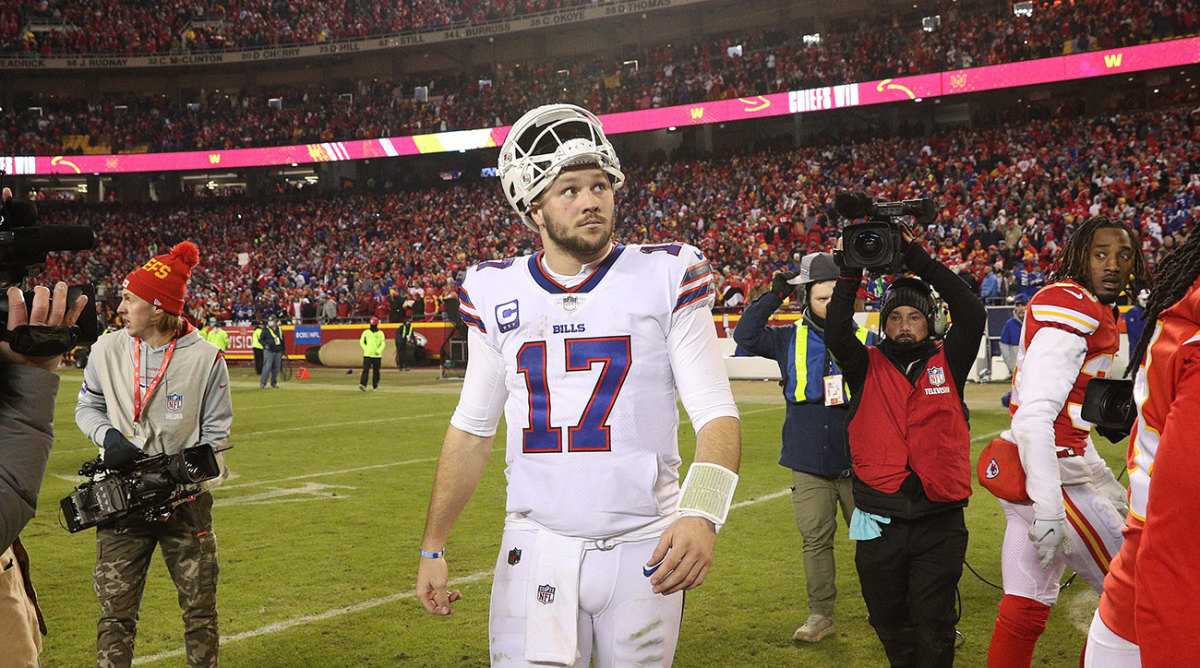The NFL’s New Overtime Rules Will Stem Complaining, But Lack Creativity
The NFL’s amended overtime proposal, announced Tuesday, which will now allow every team to possess the ball in an extra period during the playoffs only, is the perfect encapsulation of the league as a whole. It’s the perfect snapshot of its stalled creativity and its opinion of both the consumer base and the player population that makes up its workforce.
The rule does nothing more than prevent a momentary surge of mass complaining from a jaded fan base upset that its faulty defense was scored on in a critical moment of a huge game. It prevents all of us from wondering aloud what would have happened if Josh Allen had gotten the ball back in January, or if Patrick Mahomes had gotten it back in January 2019 against the Patriots. Or, at least, it prevents us from having to wonder the next time. The new rule momentarily prevents us from realizing that, even if both quarterbacks had gotten a chance, they’d be handing the ball back to the same opposing juggernaut offense that ripped them apart on the previous possession and would probably be on the sidelines watching a game-winning score, anyway. Instead of pain and frustration, here is pain and frustration prolonged.

Perhaps the overtime format now just favors the coin toss winners in a different way. Maybe, like at the NCAA level, common sense will prompt the coin toss winners to kick the ball so they have a complete understanding of what they’ll need to accomplish on their offensive possession. The only certainties we can derive are that the rule pushes even further away the possibility that one of the truly fascinating and intellectually stimulating proposals that have been brought to the table might actually be considered. The rule also keeps tired players on the field longer, which further heightens the risk of injury.
Overtime in the NFL should match the increased stakes fostered by its sporting counterparts. It should change the parameters significantly. It should force the coaches being paid astronomical sums of money to sit on their thrones of supposed genius to dazzle us, and dazzle us quickly. The Titans proposed the team that wins the coin toss can score a walk-off touchdown only if it converts an additional two-point conversion. This combines the artfulness of a touchdown drive with a showcasing of goal-line play calling, which can feature some of the most inventive looks in the sport such as the Philly Special; the Chiefs’ Travis Kelce wildcat or Patrick Mahomes–in-motion packages; or the Bears’ trio of beefy defensive linemen, who sold a play-action pass to an offensive tackle under Matt Nagy.
The Ravens famously proposed spot and choose (as explained to The MMQB’s Albert Breer here), which keeps a sudden death feel but forces coaches to strategize more deeply. In spot and choose, the coin toss winner could choose to either play offense or defense, or where to spot the football. The other team gets to make the remaining choice. There is a delicate dance here. There is something to chew on.
The NFL’s new overtime rule made me think back to an episode of The Office, in which a pretzel cart comes to Scranton Business Park once a year to provide a free treat to each worker. The cart bakes each soft pretzel individually in a small toaster oven and tops it one at a time. The line is astronomical and stalls productivity throughout all companies in the complex.
If the NFL were solving this problem the way it approached overtime, it would simply add another day for the pretzel cart to come, which would gum up productivity on two separate days (and further bog us down in poor health). If someone else were taking a fresh look at pretzel day, they might advocate for more workers at the pretzel cart, a bigger pretzel oven or different options to feed more people quickly.
Of course, this has never been the NFL’s approach. This league only extends inventiveness and creativity toward avoiding public accountability for divisive societal issues or spin-arting its finances to maximize returns for a horde of billionaire owners. The on-field problems are swatted away with the kind of simplistic dismissiveness with which they think we operate.
They see us flooding Twitter and Instagram with spur-of-the-moment complaints and their solution is to shut off the hose. We’ll get more of the same milquetoast thought that brought us into this moment. And we’ll be forced to like it.
Overtime should bring out the best in the sport—incredible, distilled snapshots of what we love about the game. What we have is kind of a long day at a sad casino. Most of the result is out of our ultimate control, still dependent on the chucking of a coin and less on some mind-bending play call or statistical analysis done by one of the statistics Ph.D.’s employed by every team’s analytics department. Most of it comes down to who can hold the ball at the correct moment and not who can do the thing most deserving of a playoff victory.
The NFL should be able to provide us with our pretzels faster and with a flourish. Not just with more pretzels.
More NFL Coverage:
• Don’t Trade Saquon Barkley or Christian McCaffrey Just Yet
• Math Behind the Wide Receiver Blockbusters
• The New Normal of Madden Roster Building
• Buccaneers, Bills Lead Super Bowl LVII Futures
